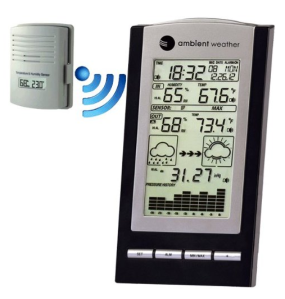To start we would explore the littlebits starter kit to learn how they work, and then make the barometer I outline in the Thrifting with littlebits post. The purpose of this experiment is to determine if air pressure has a relationship to precipitation.
Student will observe the readings on the bargraph that measure the atmospheric pressure at least once a day. They will also observe whether it rains that day. Once sufficient data is collected, students will do a hypothesis test to determine if pressure effects precipitation rate.

 According the the finding from Boger (2006) article this kind of student generated data actually decreases the perception of relevance of statistics. Atmospheric pressure could easy be obtained by looking a old weather reports. Students would most likely find measuring them slow. Mishra's (2012) work on the TPACK framework emphasizes that teachers need to repurpose technology to fit the content and the pedagogy. Mishra and Koehler (2006) find that technology needs to be integrated efficiently into the content and pedagogy. With the littlebits, I could not find a way the integrate them effectively into my classroom. While they were fun to play with and easy to make little circuits, something like an entire weather station can be bought for about half the price. This unit would also be more accurate.
According the the finding from Boger (2006) article this kind of student generated data actually decreases the perception of relevance of statistics. Atmospheric pressure could easy be obtained by looking a old weather reports. Students would most likely find measuring them slow. Mishra's (2012) work on the TPACK framework emphasizes that teachers need to repurpose technology to fit the content and the pedagogy. Mishra and Koehler (2006) find that technology needs to be integrated efficiently into the content and pedagogy. With the littlebits, I could not find a way the integrate them effectively into my classroom. While they were fun to play with and easy to make little circuits, something like an entire weather station can be bought for about half the price. This unit would also be more accurate.However, I do have some ideas to use littlebits in other content areas.
Boger, P. (2001). The Benefit of Student-Generated Data in an Introductory Statistics Class. Journal of Education for Business, 77(1), 5–8. doi:10.1080/08832320109599663
Mishra, P. (2012). Rethinking Technology & Creativity in the 21st Century: Crayons are the Future. TechTrends, 56(5), 13–16. doi:10.1007/s11528-012-0594-0
Mishra, P., & Koehler, M. J. (2006). Technological Pedagogical Content Knowledge: A Framework for Teacher Knowledge. (T. Bastiaens, J. Dron, & C. Xin, Eds.)Teachers College Record, 108(6), 1017–1054. doi:10.1111/j.1467-9620.2006.00684.x

No comments :
Post a Comment